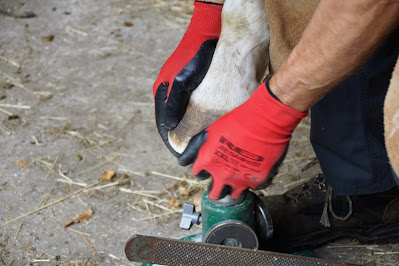Throughout my years as a horse trainer, I always urged people not to marry an idea when it came to their horse's hooves. At the time my horses tended to wear shoes and we covered a lot of miles over gravelly tracks. I have always believed that most if not all horses can be transitioned to being barefoot but recognized that for a lot of people the ideal grazing, feeding, and management routine, especially when the horse was at livery, were not easy to achieve. To my mind it was better to have a horse that was sound in shoes than one that was being made to suffer for a long period during the transition process or even forever. I once rode a horse that felt almost crippled (I nursed him around a very short circuit, keeping to the grass, and led him home) and yet the owner was taking him out like that every day and thought nothing of it - perhaps having forgotten what a comfortable horse should feel like.
The turning point for me came when Theoden succumbed to a second degenerative disease, substantial arthritis in his hock, when he has previously been diagnosed with navicular in one of his front hooves. These events came very close together and I was being told by the vet and farrier that he would need special remedial shoes forever whereas the barefoot advocates were saying take his shoes off altogether. I knew in my heart that I would not ride him again (so you could argue that I haven't put being barefoot to the test) so decided to take his shoes off altogether and monitor the results very carefully. When I took him off the Bute he was sound and has been ever since except when the ground was particularly hard and frozen. I took Dave's off at the same time and put boots on him to go out riding and he has been sound throughout save for one hoof abscess.
The changes in their hoof shape and condition has been remarkable. Both have better heels and frogs and their hooves are really hard. I believe that this is not only because they have no shoes on but also because they are trimmed every four to six weeks and rasped in between. Any problems that we see arriving are treated very quickly with Red Horse products which I would recommend to everyone. The donkeys and the semi-feral ponies have also benefitted from this regular attention which is achievable because David is now able to trim our own equines.
It hasn't saved us much money - trained barefoot trimmers spend a long time with your horse and charge accordingly - and we have our barefoot trimmer out every six months or so. We should be able to limit this to once a year unless we have a real problem but she comes just to make sure that are staying on track.
Would Theoden stay sound ridden? I don't know as I expect I'd want to ride him in boots, but he is absolutely sound in the field.



